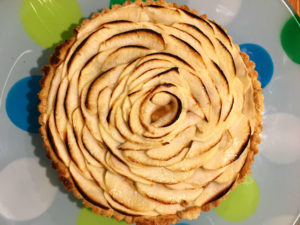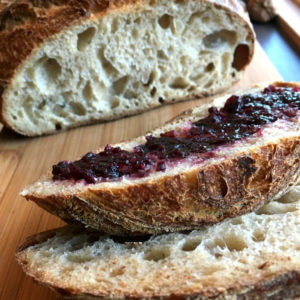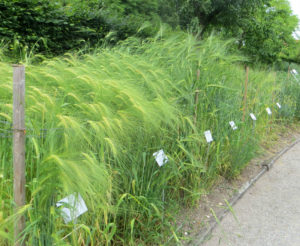Imagine every Wednesday, before the sun rises, a bag of baked goods is delivered to your front doorstep. With anticipation you open the front door to retrieve the large bag with a box and several smaller bags filled with delectable flavors. You first look for the breakfast treat: pastries, muffins, scones, or bagels. Taking your first bite, you are transported to a memorable bakery while savoring the flavors in your own breakfast nook. This is no ordinary delivery. Instead it’s the best baked products from the finest flavored, heritage wheat cultivars available. The baked goods are only offered by Cereal Box Bakery and can be delivered to your door, too. You explore the rest of the delivery: sourdough, sandwich bread, granola, emmer farro pasta, baguettes, rosemary crackers, graham crackers or cookies. With each delivery I am impressed. Sadly Cereal Box Bakery is no more, but the memories live on.

Cereal Box Bakery Classic Apple Tart
When I was a young kid, my Dad would sneak out early Sunday morning to bring home a box of freshly baked pastries and donuts to the delight of me and my siblings. Now every week, I await my Cereal Box Bakery arrival with the same anticipation. Rob Salvino of Cereal Box Bakery set out a year ago to “make baked goods fun again.” He crafts a bag with different selections every week. Rather than the sugar and white flour bomb of my childhood, I relish the baked goods as they are filled with stone-ground wheat, which have the germ and the bran retained, and thus a more robust flavor. I know it is way better for my body over the roller-milled, carbohydrate-rush, commercially grown, all-white flour. Added benefits are supporting our local Washington agricultural community, keeping heritage wheat varieties in production, fostering a neighborhood business, and it tastes good, too.
In September, my bag featured a miniature luscious, flaky crusted tart with apples from Tonnemaker Hill Farm in Royal City. Just before Thanksgiving, the treat was a mini-pumpkin pie. Valentine’s Day, a Panettone, the Italian sweet bread usually associated with Christmas, arrived with chocolate nubs, dried cherries, and an essence of citrus. This week I’m awaiting cranberry scones with Sonora wheat and dried Starvation Alley cranberries harvested last fall in Long Beach, Washington.

Cereal Box Bakery Sourdough
I always get Rob’s favorite bread–sourdough–in my delivery rather than the sandwich loaf option. The sourdough bread flavors are perfect because he uses various stone-ground heritage wheat varieties, such as Sonora Gold and Turkey Red from Palouse Colony Farm. Heritage wheat varieties are similar to heirloom tomatoes, in that they were commercially grown before the 1950’s but aren’t typically grown today. Now, they are found on smaller specialty farms serving markets where customers care about flavor, growing conditions and maintaining a robust stock of wheat varieties. According to Wayne Carpenter of Skagit Valley Malting, another specialty grain user for malted beverages, there are more than 20,000 wheat varieties. Even with the abundance of varieties only a few hundred acres of the specialty wheats are grown in Washington.
Large farms grow varieties that have high yields and are simple to sell to bakers and retailers because the wheat has known and expected baking characteristics. As a casual baker, I only recently learned that all flour is not the same. Depending on the amount of protein in a milled wheat, it may rise a lot or a little in a baked product. Customers expect a certain amount of loft in their bread, only so many holes, and a consistent product. This often prevents bakers (even home bakers) from experimenting with new wheat varieties as they don’t know whether the end product will meet their own specifications and more importantly, be acceptable to their customers.
The Wheats
Palouse Colony Farm is located in eastern Washington in what is commonly called The Palouse, an area of gentle rolling hills formed over thousands of years by windblown silts. It is a fertile region where dryland or non-irrigated wheat is grown and is definitely the bread basket of Washington. Dick and Don Scheuerman, owners of Palouse Colony Farm grow specialty landrace and heritage grains. Landrace grains “were originally raised by settlers in colonial America and the pioneers of the Pacific Northwest” and are non-hybridized strains, meaning they are not crossbred with other grains to create a new variety. Heritage/Heirloom grains are hybridized but no longer widely grown.

Wheat Varieties at the Munich Botanical Garden
Sonora Gold is the first wheat planted in the Americas having been brought by the Spaniards to Mexico in the 1600s. Transported up the west coast by Spanish missionaries, Sonora wheat filled California Central Valley with close to three million production acres by the 1880s. It was the wheat variety used to make large flour tortillas, a mainstay of Californian/Hispanic meals. Sonora is drought tolerant, disease resistant, early maturing, and has a good yield. With the advent of modern wheat varieties, now grown predominantly in the plains states, California wheat production plummeted with commercial production of Sonora ending in the 1970’s.
Turkey Red wheat arrived in the United States from Crimea (formerly part of the Ukraine and now part of Russia) via Mennonite farmers fleeing Tsarist persecution in the early 1870s. It was planted for 70 years as the dominant hard red winter wheat in Kansas until the mid-1940’s when it was replaced by modern higher-yield varieties. It is not commercially grown now, but is instead a heritage breed savored for its complex, rich flavor and excellent baking quality.
Rob also sources emmer farro wheat and einkorn wheat from Bluebird Grain Farms in Winthrop, Washington and other flours from Fairhaven Organic Flour Mill to bake and prepare his products. Purchasing a weekly share from Cereal Box Bakery supports a small business and benefits the farmer with up to “seven times the price received in mainstream (food supply) chains,” according to a June 2010 Economic Research Report.* Whole grain wheat flour is also exceedingly nutritious with high protein and fiber levels, as well as it tastes good, too! Get ready to have your taste buds tantalized with new flavors of hearty and luscious baked goods from Cereal Box Bakery to start your day.
Kathryn Gardow, P.E., is a local food advocate, land use expert and owner of Gardow Consulting, LLC, an organization dedicated to providing multidisciplinary solutions to building sustainable communities. Kathryn has expertise in project management, planning, farmland conservation, and civil engineering, with an emphasis on creating communities that include food production. Kathryn’s blog muses on ways to create a more sustainable world and good food!
* King, Robert P., Michael S. Hand, Gigi DiGiacomo, Kate Clancy, Miguel I. Gomez, Shermain D. Hardesty, Larry Lev, and Edward W. McLaughlin. Comparing the Structure, Size, and Performance of Local and Mainstream Food Supply Chains, ERR-99, U.S. Dept. of Agr., Econ. Res. Serv. June 2010.

